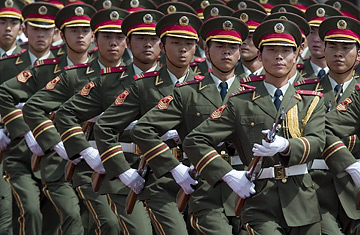
Peoples Liberation Army soldiers parade before the Great Hall of the People in Beijing on Tiananmen Square.
Less than a year later, that "precious opportunity" may be at risk, because whatever impetus the Fallon visit gave toward banishing "ignorance and suspicion" is plainly dissipating. Two months ago, China for the first time tested successfully an anti-satellite missile, but then was mum about it publicly for almost two weeks, despite being pressed for information by not only Washington but Moscow, Tokyo and several other foreign governments. The relatively long delay in any official comment from Beijing even fueled speculation as to whether China's civilian leadership was aware of the test before it happened.
Then, yesterday in Beijing, China took the occasion of a visit from the U.S. State Department's new point man for Sino-U.S. relations — just confirmed Deputy Secretary of State John Negroponte — to reveal that its defense spending in the forthcoming year would rise by nearly 18%, to almost $45 billion, the biggest increase in five years, and a larger increase than U.S. defense officials had anticipated. The U.S. believes that a straightforward accounting of total military expenditures — including new equipment purchases, which Beijing does not include in its report of annual defense spending — would amount to $150 billion.
The amount the U.S. spends on defense, of course, dwarfs that sum. The Pentagon will get a projected $620 billion in 2008. Even Japan spends considerably more than China. And most defense planners in the U.S. still believe the primary strategic objective for China's defense spending is to deter the U.S. from intervening in any crisis over Taiwan.
But it's not really the numbers that matter here; it's the lack of information behind the numbers. Whether it was China's intention or not, Negroponte clearly felt sandbagged as he left Beijing. And, together with the anti-satellite missile, that makes it twice in three months that U.S. officials have felt that way. "It's important in our dialogue that we understand what China's plans and intentions are," Negroponte said at a Sunday press conference before heading home. It's true that the U.S. continues to participate in periodic, lower-level meetings between Pentagon and Defense Ministry officials (the so-called Defense Consultative talks). But while he was CINCPAC commander, Admiral Fallon took some heat from critics in the U.S. who feel he was way too solicitous of his counterparts in Beijing, who some defense analysts believe remain overtly hostile to the Pentagon and its huge presence in East Asia. Unfortunately for Beijing, its game of hide the bacon in the last three months gives those critics more ammunition than they had before.
